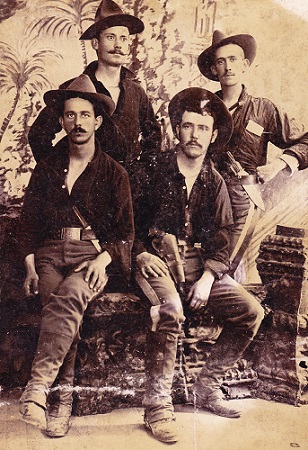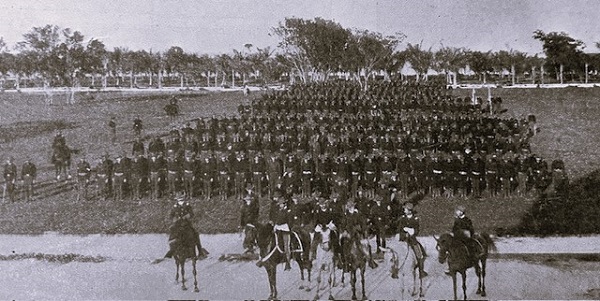


The First Alabama Volunteer Infantry served its term of service within the continental U.S. during the Spanish American War.
Unit History:
The 1st Alabama Volunteer Infantry was organized at Mobile, Alabama and was mustered into the federal service between May 9 and May 24, 1898. At the time of mustering in, the regiment consisted of forty-eight officers and 941 enlisted men. The regiment was commanded by Colonel E. L. Higdan, assisted by Major T. O. Smith.
The regiment was initially assigned to the Fourth Army Corps, being in the corp’s Third Brigade of the First Division, but on June 26, it was transferred to the First Brigade, First Division of Maj. Gen. Fitzhugh Lee’s Seventh Army Corps. The regiment had departed Mobile for Miami, Florida on June 25, arriving on the same day that the transfer occurred.
The regiment remained at Miami until August 12, when, it joined departed for Jacksonville, Florida’s Camp Cuba Libre, arriving the following day. On the same day, Spain and the United States agreed to an armistice, ending the war’s fighting, though a formal peace treaty would not be signed until December. With the war’s fighting over, and the need for the regiment’s existence ended, the regiment requested to be released from service.
Apparently, while encamped at Camp Cuba Libre, the volunteers showed that they were having some difficulty taking their duties seriously any longer. Men of the Second Louisiana Volunteer Infantry found that the shortest route back to their camp was though the camp of the First Alabama. One night, as a soldier of the former regiment approached, he was stopped by a First Alabama sentinel who called to the soldier to halt, while simultaneously bringing his rifle up into the firing position. The two looked at each other until finally the sentinel said “You can’t get through this line unless you say Hobson,” giving the intruder the password. “Hobson!” came the reply. At that, the sentinel dropped his rifle to present arms. The intruder then saluted and was allowed to pass.
On September 13, the regiment departed Jacksonville for Birmingham, Alabama, arriving the following day. At Birmingham, the regiment was given a thirty day furlough, beginning on September 19 and was paid. The combination of money and the regained freedom was too much for some of the men, and their actions sullied the regiment's reputation. Following their release on furlough, some of the soldiers of the regiment, encamped at East Lake, went on a rampage. Several bloody affairs resulted, with the most serious resulting in the shooting of Private John M. Slate of Company M by Private David B. McClung of the same company. The cause of the dispute between the men had to do with the latter supposedly tying to secure the best piece of meat from the pot in the kitchen, with the former objecting to his actions. Heated language led to each grabbing weapons, initially a knife and a sharpener. McClung then left and returned to the kitchen with a rifle. He fired with the shot exiting Slate's body near the heart. Slate lingered for several weeks, but eventually he contracted pneumonia. However, he appears to have survived. In a confrontation with the camp provost guard, several drunken soldiers were left with bayonet wounds. Another soldier was seriously injured in a fight in camp.
The First Alabama Volunteer Infantry was mustered out of service on October 31, 1898 at Birmingham. At the time of mustering out, the regiment consisted of forty-nine officers and 1,089 enlisted men. During its term of service, the regiment lost one officer and fifteen enlisted men to disease. Thirty-one men were discharged on disability. In addition, thirty-two enlisted men deserted.
On December 10, 1898, the Treaty of Paris was signed between the United States and Spain, formally ending the Spanish American War. Ironically, eight days later, William Simms formerly of the regiment's Company E shot and killed a man named Rod Norton of Town Creek at a country dance. In spite of its service to the country, the regiment proved more dangerous to American citizens than to the military forces of Spain.

The 1st Alabama Volunteer Infantry on the Parade Ground
“A Bloody Pay Day,” Trenton Evening Times. (Trenton, New Jersey), September 20, 1898, 1.
Clerk of Joint Committee on Printing, The Abridgement of Message from the President of the United States to the Two Houses of Congress. (Washington: Government Printing Office, 1899) Vol. 3, 219.
Correspondence relating to the War with Spain And Conditions Growing Out of the Same Including the Insurrection in the Philippine Island and the China Relief Expedition. Vol. 1 (Washington: Government Printing Office, 1902) 530-534, 600.
“The Inexorable Sentinel,” The Evening Democrat. (Warren, Pennsylvania), August 26, 1898, 2.
"Fatal," The Birmingham News (Birmingham, Alabama). September
20, 1898, 5.
“First Alabama Leaves Miami,” Daily News. (Naugatuck, Connecticut), August 12, 1898, 1.
“Lynchers Failed,” The Argus. (Middletown, New York), December 22, 1898, 2.
McCully, Marla - photo of the group of four members of Company G.
"Private Sizemore, Birmingham," Chattanooga Daily Times
(Chattanooga, Tennessee). October 4, 1898, 2.
“Schley Honored,” Davenport Daily Leader. (Davenport, Iowa), November 7, 1899.
"Slate Sitting Up," The Birmingham News (Birmingham, Alabama).
October 20, 1898, 6.
“Want to Leave Army,” Evening Democrat. (Warren, Pennsylvania, August 23, 1898, 2
Statistical Exhibit of Strength of Volunteer Forces Called into Service During the War with Spain; with Losses from All Causes. (Washington: Government Printing Office, 1899).
Wright, General Marcus J., Wright's Official History of the Spanish American War. (Washington: War Records Office 1900), 237.